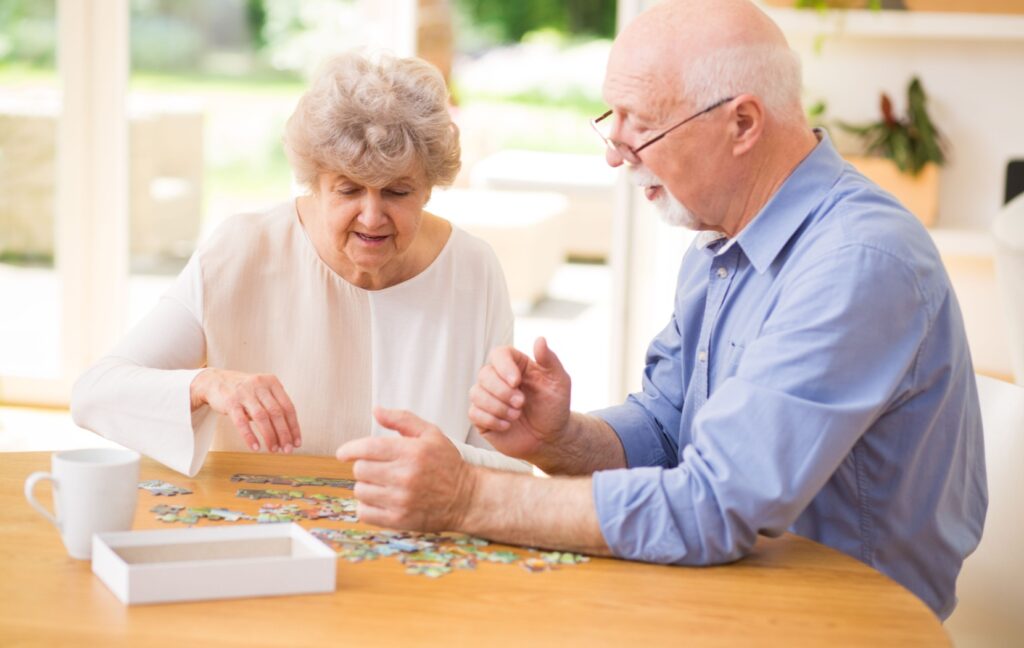Maintaining cognitive health as an older adult is a key part of staying independent for longer. Working memory is the part of our brain that can hold and manipulate information. We use it for tasks like having conversations and visualizing things.
But is working memory something you can improve, or is it impossible to get back? Fortunately, it’s possible to improve working memory through games, puzzles, learning new skills, and even physical exercise. Activities that can improve working memory can be done alone or in groups, meaning that, no matter your preferences, you can find an enjoyable activity that improves your working memory!
What Is Working Memory?
Working memory is your brain’s ability to hold and manipulate information. It’s what allows you to follow a conversation, remember where you left your keys, or plan your day. It plays a crucial role in decision-making, problem-solving, and maintaining independence.
Just like physical fitness, mental fitness requires practice and intentional effort. Engaging in activities that challenge your brain can strengthen your working memory and keep it performing at its best.
The Benefits of Brain Games
Games aren’t just for kids; they’re also an excellent tool for older adults to sharpen their minds. Brain games are activities designed to stretch your cognitive muscles, enhancing problem-solving skills, attention span, and memory retention.
These games tap into neuroplasticity, the brain’s ability to form new connections and adapt. This means that, when you regularly challenge yourself with puzzles or strategy-based games, you’re essentially “retraining” your brain to become stronger and more efficient.
Some popular cognitive games include:
- Word puzzles like crosswords or word searches to enhance vocabulary and memory
- Memory card games that encourage recall and concentration
- Sudoku to boost logical thinking and pattern recognition
- Strategy games such as chess or checkers to refine critical thinking
- Trivia quizzes to test and expand your knowledge on a variety of topics
The best part? These exercises are as fun as they are effective. With just a few minutes a day, you can give your brain the workout it needs.
Solo Activities vs. Group Activities
When choosing mental exercises, consider both solo and group activities.
- Solo activities create opportunities for quiet focus and independence while encouraging problem-solving. For example, working through a crossword or jigsaw puzzle alone provides a sense of accomplishment and mental stimulation.
- Participating in group games, like trivia or board games, adds a social element, fostering connections and improving emotional well-being alongside memory and critical-thinking skills.
By balancing both types of activities, you can enjoy the benefits of focused thinking while also strengthening your social circle.
The Power of Board Games
Classic board games remain a fantastic way to stimulate your mind. Games like chess, card games, and backgammon challenge players to strategize, analyze, and plan their moves—all while creating an engaging, interactive experience.
These games also improve memory by encouraging players to recall past strategies to make informed decisions during gameplay. Plus, playing these games with friends or family adds an extra layer of enjoyment, turning mental workouts into meaningful bonding time.
Word & Logic Games
Word and logic games help maintain cognitive health.
- Crossword puzzles build vocabulary, improve memory, and boost general knowledge.
- Sudoku enhances logical thinking and sharpens problem-solving skills.
Both games are portable, accessible, and easy to add to your daily routine. Whether you’re solving a Sudoku puzzle over coffee or racing through a crossword while waiting for an appointment, these games bring cognitive growth to even the busiest of days.
Visual Puzzles for Memory & Focus

Jigsaw puzzles are another excellent tool for improving memory and concentration. They require focus, spatial awareness, and critical thinking, all of which engage different areas of your brain.
Organizing pieces by shape, size, or color is a great way to develop organizational skills. Completing jigsaw puzzles also provides a satisfying reward, making it a great shared activity for families to enjoy together.
Learn Something New
Few things challenge the brain like learning a new skill, making this one of the most effective ways to improve working memory.
- Learning a new language involves memorizing vocabulary, mastering grammar, and forming sentences, which strengthen memory retention and cognitive flexibility.
- Picking up an instrument enhances coordination and focus while challenging memory as you learn new songs.
The key is consistency—dedicate regular, manageable chunks of time to your new skill and watch your mental flexibility grow.
Building a Mentally Engaged Lifestyle
While at-home activities are helpful, a structured environment can provide even more opportunities for consistent mental stimulation. Senior living communities, for example, often offer programs and classes designed to support cognitive health. At All American Assisted Living at Washington Township, we offer programs meant to help our residents maintain their working memory and cognitive health. If you’re interested in learning more about our programs and lifestyle options you can schedule a tour of our community today!





